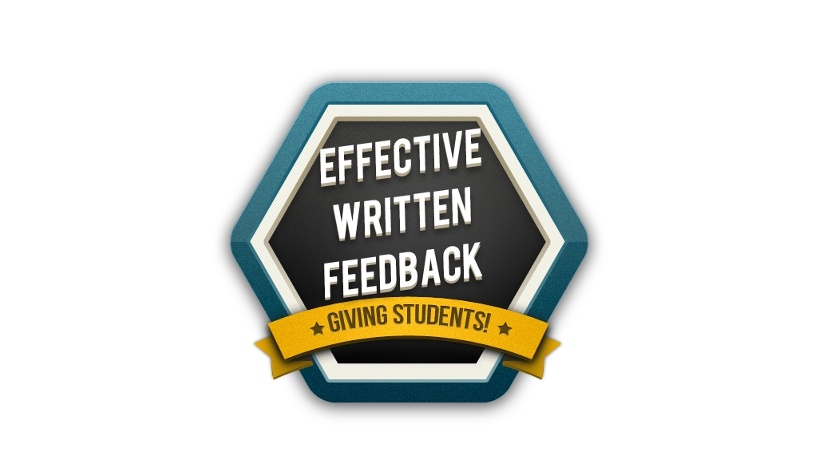Definition And Benefits
For many instructors, grading papers is not just a spot check for errors. Higher education instructor often provide written feedback in order for their student to achieve higher levels of self-efficacy, to master new skills, to attain the expected learning outcomes, and to gain academic confidence. The purpose of this article is three-fold:
- to define written feedback and identify the benefits of effective written feedback,
- to identify the components of effective written feedback, and
- to provide an acronym that reminds instructors of the importance of giving effective written feedback for their students.
According to Dekker, Schonrock-Adema, Snoek, & Cohen-Schotanus (2013), written feedback can “enhance how students reflect on their professional development” (p. 6). Likewise, written feedback can help students become better academic writers and more self-directed in their learning processes (El Ebyary & Windeatt, 2010). Written feedback, also known as “corrective feedback”, is any feedback addressed to the student identifying “learner errors” (Russell & Spada, 2006, p. 134 as cited in Evans, Hartshorn, & Tuioti, 2010, p. 48). Besides checking for errors, written feedbacks also carry the instructors’ voices and encourage students by adding positive comments. Written feedback can come in several forms including electronic written feedback (Evans et al., 2010). Written feedback is therefore any type of feedback from the instructor correcting student mistakes and using the instructor’s voice to teach, mentor, and help the student achieve the expected learning outcomes, as indicated by the students' mastery of new skills and academic confidence.
Not all written feedback is considered effective. Instructors who provide written feedback with grammatical errors only confuse their students (Evans, et al., 2010). Likewise, instructors who provide harsh and insensitive written feedback only discourage their students (Evans et al., 2010). Often, instructors do not have the time to provide effective written feedback (Dekker et al.,2013; El Ebyary & Windeatt, 2010; Evans et al., 2010). Also, some instructors refrain from giving written feedback in order to keep students from feeling discouraged or even overwhelmed (Evans et al., 2010). However, the absence of written feedback is a missed opportunity to:
- increase the students’ awareness of their mistakes,
- understand their mistakes, and
- correct them (Evans et al., 2010).
PC GAME represents the key components of Effective Written Feedback
Components
The acronym PC GAME represents the key components of effective written feedback. Effective written feedback must contain Positive comments aiming at Correcting student mistakes. The comments must be free of Grammatical errors, and written in an effort to help the student gain Academic confidence, Mastery of skills, and achieve the Expected learning outcomes and Self-efficacy.
Literature Review and Conclusion
Three studies analyzed whether higher education instructors provided effective feedback as they graded written assignments. The instructors used effective feedback as a comprehensive way to teach their students and establish learning discourses. Randall and Zundell (2012) conducted a study using effective written feedback in an introductory problem solving and economic theory class for first and second year students. Likewise, Budge (2011) conducted a similar study, using electronic and face-to-face feedback assessments for mixed college level students in an Australian university. East, Bitchener, and Basturkmen (2012) conducted a similar study for postgraduate students and found that effective feedback helped them see their faculty members as equal partners in completing their projects. In all three studies, the students used effective feedback from their instructors as a learning tool, and as a guidepost for their subsequent assignments.
References
Budge, K. (2011). A desire for the personal: Student perceptions of electronic feedback. International Journal of Teaching and Learning in Higher Education, 23(3) 342-349.
Dekker, H., Schönrock-Adema, J., Snoek, J. W., van, d. M., & Cohen-Schotanus, J. (2013). Which characteristics of written feedback are perceived as stimulating students' reflective competence: An exploratory study. BMC Medical Education, 13, 94. doi:http://dx.doi.org/10.1186/1472-6920-13-94
East, M., Bitchener, J., & Basturkmen, H. (2012). What constitutes effective feedback to postgraduate research students? The students’ perspective. Journal of University Teaching and Learning Practice, 9(2) 1-18. Retrieved from
El Ebyary, K., & Windeatt, S. (2010). The impact of computer-based feedback on students' written work. International Journal of English Studies, 10(2), 121-142,184-185,187. Retrieved from http://search.proquest.com/docview/865733886?accountid=14872
Evans, N. W., Hartshorn, K. J., & Tuioti, E. A. (2010). Written corrective feedback: Practitioners' perspectives. International Journal of English Studies, 10(2), 47-77,183,185. Retrieved from http://search.proquest.com/docview/865733917?accountid=14872 http://www.eric.ed.gov/PDFS/EJ984908.pdf
Randall, L., & Zundel, P. (2012). Students’ perceptions of the effectiveness of assessment feedback as a learning tool in an introductory problem-solving course. Canadian Journal for the Scholarship of Teaching and Learning, 3(1) 2-16. Retrieved from http://www.eric.ed.gov/PDFS/EJ985736.pdf








